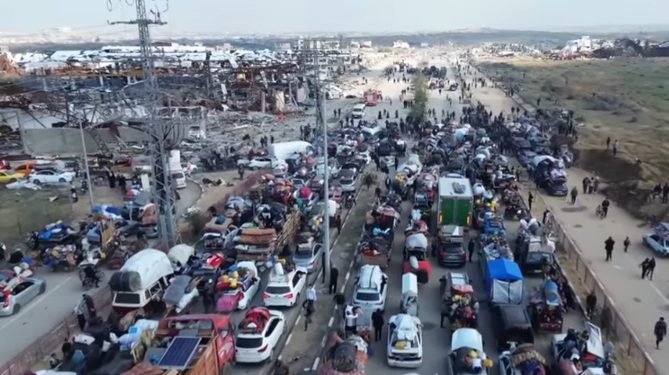Notwithstanding its pledge to comply with the humanitarian protocol outlined in the ceasefire agreement with Gaza, the Israeli occupation is still delaying the entry of fuel and shelter supplies into the Gaza Strip in the midst of an unprecedented humanitarian crisis.
International humanitarian law, which mandates that the occupation make sure humanitarian aid reaches civilians and refrain from using food and relief as instruments of political or military pressure, is flagrantly broken by these actions.
According to the government media office in Gaza, the Israeli occupation failed to fulfil its commitments and implement the terms it signed because it still blocks the entry of shelter supplies and relief aid, worsening the situation for hundreds of thousands of displaced people who lost their homes as a result of Israeli bombing.
60,000 caravans and 200,000 tents were allowed to enter as part of the humanitarian protocol to house the displaced, along with 600 trucks carrying aid every day, including 50 trucks carrying petrol and fuel. On the other hand, the Israeli occupation continues to impose restrictions and manipulate the implementation of the agreement, so the actual numbers are significantly lower than what was agreed upon.
According to the Geneva Conventions, the Israeli occupation’s denial of humanitarian aid to civilians is a war crime since it is a grave breach of international law to deny emergency relief.
The United States, Egypt, and Qatar are among the guarantors of the agreement, but they are still unable to fully enforce the humanitarian protocol.
The government office in Gaza called on international parties to take decisive action and apply significant pressure to guarantee the delivery of aid, holding the occupation and the US administration entirely accountable for the consequences of this obstruction. Experience reveals that this is not the first instance of the occupation purposefully delaying; in January of last year, for example, it blocked approximately 339 aid trucks from entering the northern Gaza Strip, even though the agreement called for 1,200 trucks to arrive during that time.
As the 16th day of the ceasefire approaches, concerns are growing that Israel’s inaction is a part of a siege and starvation strategy that targets civilians in the Gaza Strip, blatantly violating all humanitarian and human rights agreements. How long will the world remain silent about these crimes? That is still an open question.




























